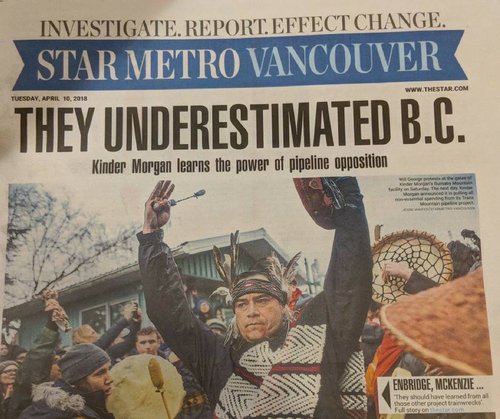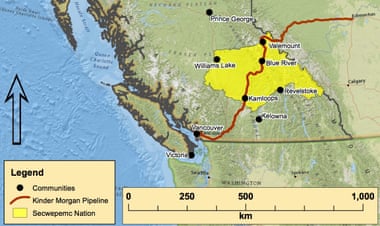No one has mentioned the price inflation of every commodity due to energy inputs cost increases. While an individual consumer may think they are unaffected because they live in a walk up garret and ride a bicycle to the green grocer, that Mexican tomato or organic kale is likely not arriving by bicycle.
In the event that Alberta stops the flow of oil to BC, the price surge and shortages will be devastating. Of course, those nice people in Washington State will be glad to supply fuel to BC in the short term. They are so nice that they will not take advantage of a captive market......will they? There is no barge or tanker unloading facility for such fuel so it must be trucked.
Bullshit. The world is awash in oil. We can ship it in from anywhere in the world at a much lower price than the crap they are making in Alberta.
Ship it in....tankers? Whatever happened to protecting the beautiful coast of BC?
There is a lot less environmental risk in docking once in a while and pumping the shit right into the storage tanks than piping it hundreds of kilometers through watersheds and then into waiting tankers. There would be constant pressure from the shit through the pipeline, making for a much higher risk of a shitloss on the coast and anywhere in between. Oil is extremely toxic to fresh water. A few gallons can kill a whole lake.
Not only that, but there are always spills through pipelines. They use the lowest bidder and the cheapest materials and labour.
You, the oil industry and its shills have had billions go through your hands. You could have built a refinery for it, but instead you paid 15% dividends and bought back stock. The processed oil in the form of gasoline and diesel would have sold for much more, and would have been transported much more safely. And maybe the poor sucker car drivers in Vancouver would have got a break.
You fucked yourselves. We just want to put you out of your misery as soon as possible so you can find real jobs helping people.
No-one but the US buys the tar sands shit anyway (and at a deep discount at that, as it is such crappy shit), so the idea to pipe it to Vancouver/Burnaby is hare-brained at least. It makes no economic sense, as Kinder Morgan is beginning to admit to its shareholders.
If you want government money to go into a shit program like this, you are no better than the Marxist-Leninists who destroyed the Aral Sea.
A large number of Canadians say "fuck the oil industry and the pipeline it oozed in on". Are their democratic sentiments of no concern to you?
Seeing as we can import the shit cheaper than making it domestically, I see no sense at all in a domestic industry. Statistics show that even as the number of cars in Canada is increasing, the amount of gasoline consumed per car is declining. Hitch your wagon to a falling star.
Oh dear, empty disingenuous rhetoric is no defense for hypocracy. Nor is vulgarity. Importing oil to spite your own country appears reasonable only to the entitled.
You make no sense whatsoever with your ill thought rant. It will take years to build the infrastructure required to import oil into BC, not counting the new NEB regulatory environment. Try informing yourself of the circumstances of BC's captive market rather than dreaming up impossible scenarios.





